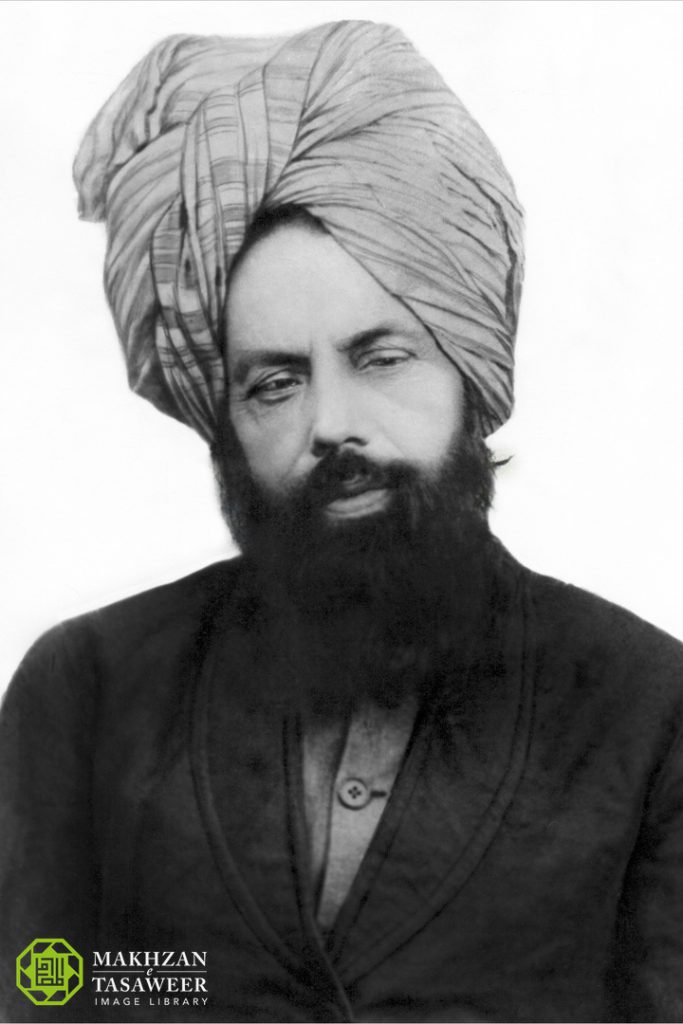Are Peaceful Verses of the Quran Abrogated?

By Missionary Mansur Ahmed Chattha
1. Introduction
Critics of Islam seek to portray Islam as a violent religion. This is especially true of Christian missionaries, but increasingly so also of New Atheists like Sam Harris, Bill Maher and Ayaan Hirsi Ali. Demonisation of the faith of others has always been used to justify demonisation of those who possess that faith. Ruling authorities have especially found this to be useful when invading the countries of those of other faiths.
The difficulty such critics face however is that the Quran utterly refutes their attempts to portray it as violent. To get around this difficulty, critics of Islam, originating with Christian missionaries, allege that the verses of the Holy Quran which were revealed later in the ministry of the Prophet Muhammad (sa) abrogate verses received earlier in his ministry. This is useful for such critics because the first thirteen years of his ministry were spent in severe persecution, forcing his followers to undertake three migrations: two to Abyssinia and one to Medina. After having migrated to Medina, the persecutors pursued the Prophet of Islam to his new home to persecute him there, over 200 miles North. It was only then, between years thirteen and twenty of his ministry, that he was permitted to take up arms to defend his faith. Since the Quran was revealed throughout his twenty three year ministry, those verses that encourage him to take up arms and fight in defense occur in the latter half of his ministry.
By asserting that verses received in the latter period of his ministry abrogate or annul those received earlier in his ministry, they assert that all the “peaceful” verses of the Quran have been annulled by “violent” verses and that it is these latter verses that stand for all time to come. As we shall see, both the concept of abrogation and also the supposition that “peaceful verses” were received in the early portion of the Prophet Muhammad’s (sa) ministry, are false.
2. The Concept of Abrogation
The theory of abrogation is entirely false. Not a single verse of the Holy Quran has been abrogated, nor is there any verse of the Holy Quran whose ruling has been abrogated by another verse. In fact, both the Quran and the Prophet Muhammad (sa) were explicit in refuting this theory.

2.1 The Quran on Abrogation Theory
God Almighty has made clear from the outset in the Holy Quran that it is a perfect book:
“This is a perfect Book; there is no doubt in it; it is a guidance for the righteous.“
Holy Quran 2:3
Moreover, God Almighty unambiguously declares that the Holy Quran is complete in every respect. God says:
“This day have I perfected your religion for you and completed My favour upon you and have chosen for you Islam as religion.“
Holy Quran 5:4
There is not a single verse that cancels out any other verse. Each verse is valid within its own context. God Almighty explicitly makes this point:
“Alif Lam Ra. This is a Book whose verses have been made unchangeable and then they have been expounded in detail. It is from One Wise, and All-Aware.”
Holy Quran 11:2
To say that certain verses cancel out others is to negate the perfect order of the Holy Quran and the wisdom of God Almighty. It is to say that contradictions exist within the Holy Quran if we do not resort to cancelling out the verses that we cannot make sense of. This is clearly against the declaration of the Holy Quran that there is no contradiction between any of its verses. God Almighty states:
“Will they not, then, meditate upon the Quran? Had it been from anyone other than Allah, they would surely have found therein much contradiction.“
Holy Quran 4:83
Moreover, God Almighty has promised that He Himself will safeguard the Holy Quran from being changed:
“Verily, We Ourself have sent down this Exhortation, and most surely We will be its Guardian.”
Holy Quran 15:10
How can a text be declared as being safeguarded if it is unknown which of its verses are abrogated by others? Even if a number is decided upon, such a belief invalidates the perfection of the text of the Holy Quran.
2.2 The Prophet Muhammad (sa) Rejected Abrogation Theory
The fact is that the Holy Prophet Muhammad (sa) never mentioned any list or number of verses of the Holy Quran that had been abrogated. If there were abrogated verses, then we would have expected him to have certainly pointed them out so that his followers would not fall into misguidance.
Quite contrary, the Holy Prophet Muhammad (sa) once advised his companions that the verses of the Holy Quran do not cancel each other out, rather they support one another. Umar Ibn-e-Shuaib narrated from his father who narrated from his grandfather, who said:
“My brother and I were sitting in a reunion that was more beloved to me than red camels. As my brother and I arrived, we found a group of dignified companions of the Holy Prophet (sa) sitting by one of the doors of his home. We disliked separating them so we sat to the side. They mentioned a verse of the Holy Quran and argued about it until their voices became elevated. The Holy Prophet (sa) then came out in a state of such anger that his face was red. He threw dust upon them and said to them, ‘Patience my people. This type of difference with their prophets destroyed the people before you and for judging as contradictory some of their books against others. Surely, the Holy Quran was not revealed so that certain parts of it reject others, in fact its various parts support each other. So follow that which you understand from it, and ask a knowledgeable person concerning that which you don’t understand.‘”
Musnad Ahmad bin Hanbal, Musnad of the treasures of the Sahaba, Musnad of Abdullah ibn-e-Umar bin Al-Aas, Hadith #6663
This statement of the Prophet Muhammad (sa) demonstrated how false and deeply upsetting it was for him that Muslims should regard different verses of the Quran as contradictory.
2.3 The Imam Mahdi (as) Rejects Abrogation Theory
The Promised Messiah and Imam Mahdi, Hazrat Mirza Ghulam Ahmad (as), emphasised how the Holy Quran was a perfect book that could not be detracted from. He wrote:
“And we have complete confidence in the fact that the Holy Quran is the last divine book, and that not an iota or dot can be added or detracted from its laws, limits, commandments and orders. Now there is no revelation or inspiration from Allah that can modify, change or abrogate any command of the Holy Quran.“
Ruhani Khazain, vol. 3 pg. 170, Izala Auham

He stated that the theory of abrogation would in fact invalidate the entire Holy Quran:
“The truth is that the (text of the) Holy Quran cannot be truly abrogated or added to because this would falsify it.”
Ruhani Khazain, vol. 4 pg. 93, Mubahitha Ludhiana
There is no abrogation in the Holy Quran. Those who claim that certain verses abrogate others, do so only due their own lack of knowledge and understanding and hence their inability to reconcile different verses with each other.
2.4 A Misunderstood Verse
The basis for advancing the theory of abrogation, by both Muslims and non-Muslims alike, is the following verse of the Quran:
“Whatever Sign We abrogate or cause to be forgotten, We bring one better than that or the like thereof.“
Holy Quran 2:107
This verse is understood by advocates of abrogation theory, to apply to the verses of the Holy Quran. If Allah abrogates some, He binds Himself to replace them with better, if not similar ones, they say.
Commenting on this verse, the medieval ulama [Muslim scholars] used to quote up to 500 verses of the Holy Quran which, in their opinion, abrogated 500 other verses. Which verses were replaced exactly by the ones abrogated is a question they never managed to answer. Similarly, the verses which were supposed to replace other verses were never proven superior in any way.
In reality, this verse of the Holy Quran has nothing to do with the abrogation of the verses of the Holy Quran, but refers to the signs and verses of past scriptures Allah demonstrated or revealed. This verse is in reference to how earlier religions were permitted by God to be lost and were either brought back with the same beauty they once possessed, or better religions were revealed to replace them.

The verse applies to a much wider, fundamental principle. When we closely observe the history of religions, we always discover that many religions were allowed by God to have been obliterated. Whenever this happened, other religions similar to them were revealed to replace them. However, if the advanced age required some new and better teachings, a new religion was brought in its stead. They were better in the sense that they could cope more efficiently with the changing requirements of the time. Thus, religions have evolved until they culminated in the final revelation of Islam.
3. “Peaceful” vs “Violent” Verses
A simple analysis of the verses of the Quran demonstrates in fact that, even if the theory of abrogation was true – which it is not, as demonstrated – it cannot be used to dismiss the so-called “peaceful” verses of the Quran. This is because most of the “peaceful” verses of the Quran were revealed… when Muslims went to war!
Here are some important “peaceful” teachings the critics of Islam would assert have been “abrogated” by so-called “violent” verses (i.e. verses permitting Muslims to take up arms in self-defence):
- That there is no compulsion in religion (Quran 2:257);
- That war can only be waged in defence (Quran 22:40);
- That Muslims must fight to defend freedom of worship in churches, synagogues and temples of other faiths (Quran 22:41);
- That Muslims must be kind and equitable to peaceful people of other faiths (Quran 60:9);
- That Muslims must not force their faith on others (Quran 50:46);
- That Muslims must not abuse the gods of other faiths (Quran 6:109)
- That Muslims, on hearing blasphemous speech, should only move away from such people, and return to them when their talk improves, etc. (Quran 4:141)
- That Muslims must strictly abide by peace treaties with idolaters and should not be tempted to throw away opportunities for peace (Quran 9:4-7)
3.1 Most of the “Peaceful Verses” Were Revealed after Hijrah!
Most of these teachings were revealed after the Hijrah [migration], or migration of the Prophet of Islam, six of the eight to be precise. The first three are from the second chapter of the Quran, Al-Baqarah, revealed after the migration; number four is from Chapter 60, also revealed after migration; numbers 5 and 6 were revealed before migration; numbers 7 and 8 were revealed after migration.

The abrogation theory therefore, even if it was correct, cannot be used to justify the removal of so-called “peaceful” verses, because many of such verses appeared after the Hijrah [migration].
3.2 No Verse is Violent – All are Peaceful
Finally, it should be noted that the very notion of “peaceful” and “violent” verses is anathema to the Quran. All of its verses promote peace and therefore can be termed “peaceful”. Even such verses as permit warfare under certain circumstances, and at times command it to uphold freedom of conscience for all, serve to ultimately secure peace through the suppression of tyranny.
3.3 Abrogating Verses is a Christian Concept
The notion of separating verses into “peaceful” and “violent” is a habit of Christians who, finding the barbarity of the Old Testament too much to bear, advocate that Jesus abrogated such teachings with his “New Covenant”, ignoring in fact that Jesus expressly stated that he had not come to change the law in the least. It is this Christian Orientalist slant, applied to Islam, that has given birth to the abrogration theory, which is false from root to branch.
4. Conclusion
The Holy Quran is a perfect and complete book. “Islam” as the word literally translates, means “peace”. Certainly, the verses that relate to peace hold just as much importance in the latter part of the ministry of the Holy Prophet (sa) as they did in the earlier period. Those who use the theory of abrogation to falsify Islam’s beautiful teachings on peace are entirely misguided. Each verse is valid and will continue to be so until the end of time.
5. Further Reading
More articles
Contact
National Outreach Department:181 London Rd, Morden SM4 5PT, U.K.
Email: [email protected]Phone: 0208 6877804
@ 2025 Ahmadiyya Muslim Community, All Rights Reserved.